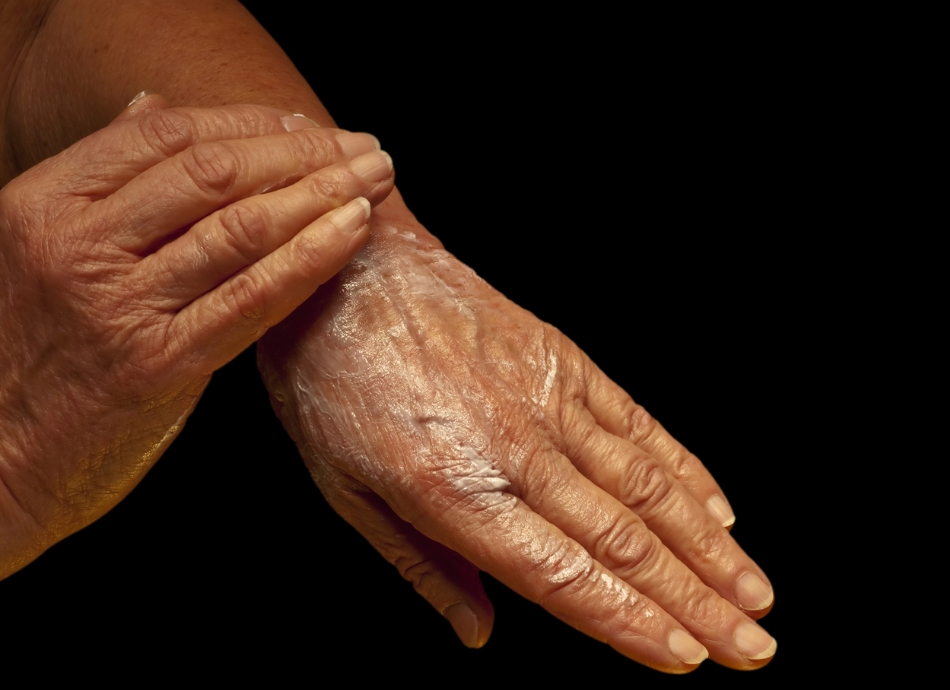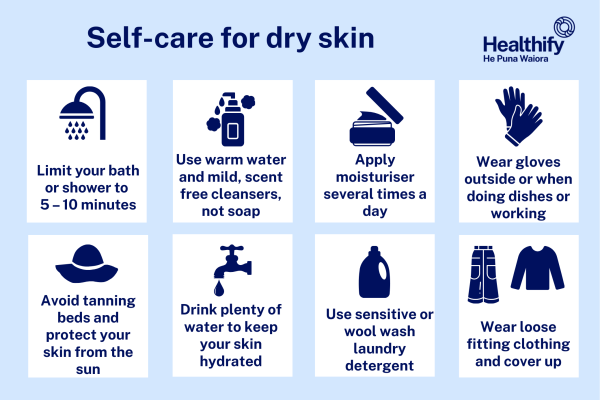If you're a frequent visitor to Healthify, why not share our site with a friend? Don't forget you can also browse Healthify without using your phone data.
Dry skin
Key points about dry skin
- Dry skin develops when your skin loses too much water.
- This can happen with increasing age, if you shower or bathe for too long or if you’re in a cold or dry climate. Some medical conditions and medicines are associated with dry skin, and some people have naturally dry skin.
- There are things you can do to help care for and relieve dry skin. Using fragrance-free cleansers and frequent moisiturising can help.
- If these things don’t help, or you have severely dry skin, you can see a dermatologist (skin doctor) for further assessment and advice.

Dry skin is skin that’s dry and rough to touch because it has lost too much water so doesn’t have enough moisture in it. Older age, some medicines, and some diseases can also cause skin to become very dry.
Your skin becomes dry when it loses water too quickly and becomes dehydrated. Some people have naturally dry skin.
Others may develop dry skin because of:
- their age
- a medical condition,
- their bathing habits
- seasonal factors.
Dry skin occurs because of abnormalities in the outer layer of your skin that mean the cells can’t hold water as well as they should.
Everyday things, such as using deodorant soaps and harsh cleaning products, can remove oils and fats from your skin. These oils and fats usually help provide a protective barrier against water loss. Washing your hands a lot, using hand sanitiser, taking long, hot showers, or living in a cold, dry place can also dry your skin.
Some people have ichthyosis which is a group of rare skin conditions that cause dry, scaly skin. Ichthyosis can be inherited or associated with a medical condition such as hypothyroidism (underactive thyroid) or some cancers.
Anyone can get dry skin, but you may be more likely to have dry skin if:
- you have a family history of dry skin
- you have atopic dermatitis (eczema)
- you’re over 60 years of age – as you age your skin produces less oil, increasing your risk of dry skin
- you spend a lot of time in a dry environment, eg, low humidity, excessive air conditioning, direct heat from a fire or fan heater
- you have a job where you have to put your hands in water a lot or use harsh chemicals, eg, hairdressers, nurses, construction workers.
Some diseases, conditions or medicines can be associated with very dry skin, including:
- menopause
- hypothyroidism
- diabetes
- chronic kidney disease and dialysis
- anorexia and weight loss
- some cancers and cancer treatments
- medicines such as oral retinoids, diuretics, statins.
If you have very dry skin, your skin may be:
- flaky and rough
- scaly
- cracked
- inflamed
- painful – your skin may sting or burn.
Your dry skin may become itchy, which mean that a form of dermatitis has developed.
Any part of your skin can become dry, although hands, arms and legs are often affected.
If you see a healthcare provider for your dry skin, they’ll aim to find out what’s causing it by taking a thorough medical history and looking at your skin.
They’ll ask:
- if you have a family history of conditions such as eczema or asthma
- what medicines or topical (skin) preparations you use
- how often you bathe
- what type of soap you use
- about any environmental factors that may cause dry skin.
If you have very dry skin that doesn’t improve with lifestyle changes and self-care, you may be referred to a dermatologist (skin doctor). They may do a skin biopsy or other tests to diagnose what’s causing your dry skin.
Dry skin is treated with moisturisers and emollients. Moisturisers add moisture to your skin to hydrate it and help restore its outer layer. They often contain emollients which soften and smooth your skin.
You should apply plenty of moisturiser frequently enough to:
- reduce itchiness and make your skin feel more comfortable
- improve the barrier function of your skin
- prevent your dry skin from getting worse
- reduce your risk of getting a skin infection.
Cetomacrogol and glycerine cream (sorbolene with glycerine) is a general-purpose moisturiser that’s non-greasy, cheap, and available without a prescription. However, you may need a moisturiser that’s prescribed by your healthcare provider. A dermatologist can choose a moisturiser that contains the right amount of active ingredients (eg, urea, ceramides, lactic acid, or glycerol) to heal your skin.
Your healthcare provider may also prescribe:
- a topical steroid if your skin is itchy or you have dermatitis, or
- a topical calcineurin inhibitor, such as pimecrolimus (Elidel®) or tacrolimus (Zematop®) if topical steroids aren’t suitable.
Some skin conditions can cause excessively dry skin, such as atopic dermatitis (eczema), ichthyosis (a rare, usually inherited, form of dry scaly skin), or psoriasis, so these will also need to be treated to help your dry skin to heal.
Do these things to help care for and relieve dry skin.

Image credit: Healthify He Puna Waiora
Bathing
- Limit your bath or shower to 5 to 10 minutes to avoid drying out your skin. If possible, bathe or shower every other day instead of every day.
- Use warm, rather than hot, water as hot water removes the natural oils on your skin.
- Use soap substitutes such as mild fragrance-free cleansers. Most emollients (moisturisers) can be used as a soap substitute and also help to lock in moisture. Avoid bubble baths and ‘unscented’ products as they may contain ingredients that can irritate dry skin.
- Pat (rather than rub) your skin dry gently using a soft towel.
Use moisturiser
- Apply moisturiser while your skin is still a bit damp to help lock in moisture, eg, after a bath or shower or after washing your face or hands.
- Apply moisturiser several times a day and within 5 minutes of taking a shower or bath, after washing your hands, and when your skin feels dry. Gently massage the moisturiser into your skin.
- Use ointment or cream rather than a lotion. Look for ones that contain one or more of the following: jojoba oil, dimethicone, glycerin, hyaluronic acid, lactic acid, lanolin, mineral oil, petrolatum, shea butter.
- Wear lip balm or use petroleum jelly on your lips.
- Read more about moisturisers and emollients.
Avoid irritants
- Only use gentle fragrance-free skin care products. Avoid products that contain alcohol (except for hand sanitisers), fragrances, or retinoids.
- Choose non-irritating clothes and sensitive or wool wash laundry detergent. Wear loose-fitting cotton clothing and avoid wool or polyester.
Protect your skin
- Wear gloves when you go outside in winter or do things where your hands get wet or will be exposed to harsh chemicals.
- Avoid the sun and tanning beds as UV rays dry the skin. Wear clothing that protects your skin, such as a wide-brimmed hat, long sleeves, and pants. Use fragrance-free sunscreen that’s SPF 30 or higher.
- Use a humidifier to add moisture to the air around you. Some home heating systems have a humidifier or you can use a portable humidifier, eg, in your bedroom while you sleep.
Hydration
- Drink plenty of water.
- Stop smoking. Cigarettes contain harmful chemicals that speed up how quickly your skin ages, so your skin becomes drier if you smoke.
If doing these things doesn’t bring relief after 1 to 2 weeks, see your healthcare provider. You should also see your healthcare provider if your skin is oozing, peeling or any other rash is present other than dryness. You may be referred to a dermatologist (skin specialist) who can assess your skin further and recommend other treatments, especially if you have an underlying cause for your dry skin.
Mild or occasional dry skin will often improve with lifestyle changes and regular moisturising.
See your healthcare provider if you have severe dry skin. Complications of dry skin include eczema and skin infection. Some people with severe dry skin also develop food allergies or allergic skin reactions.
How to stop dry skin ruining your winter(external link) Patient Info, UK
Brochures
Bathing tips for dry skin relief(external link) American Academy of Dermatology, US
Self-care information – dry skin (mild)(external link) NHS, UK
References
- Dry skin(external link) DermNet, NZ, 2022
- Dry skin(external link) American Academy of Dermatology, US
- What causes dry skin and how to treat it(external link) Healthline, US, 2023
- Dermatologists top tips for relieving dry skin(external link) American Academy of Dermatology, US, 2024
- 6 ways to help treat acne when you also have dry skin(external link) Healthline, US, 2023
What does dry skin look like?
Patches of dry skin can be flaky, rough, scaly, cracked or inflamed.
Can dry skin cause itching?
Yes, dry skin can be itchy, in which case you may have developed a skin problem. So talk to your healthcare provider.
Can dry skin cause pimples?
Yes it can. Even though pimples are more often associated with oily skin, people with dry skin can get pimples too. They can be harder to treat because many of the products used to treat pimples dry out your skin. Read more about acne.
Credits: Healthify editorial team. Healthify is brough to you by Health Navigator Charitable Trust.
Reviewed by: Dr Sara Jayne Pietersen, FRNZCGP, Auckland
Last reviewed:





